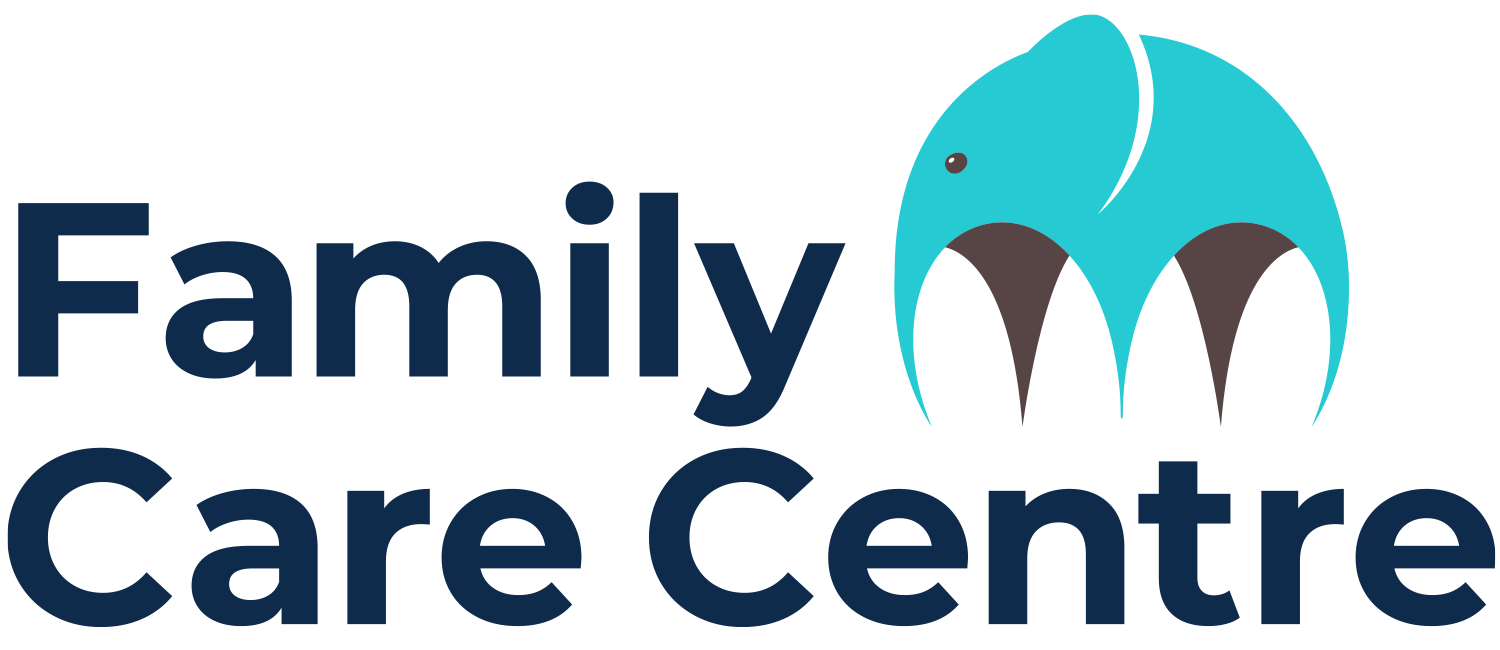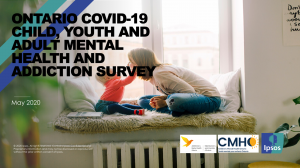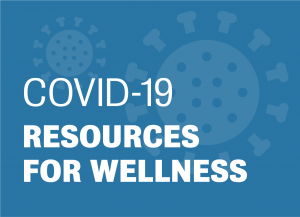Toronto, ON, May 6, 2020:
Half of Ontario children and youth at risk of mental health and addiction issues
Timed to Mental Health Week, Children’s Mental Health Ontario (CMHO) and Addictions and Mental Health Ontario (AMHO) are releasing the Ipsos Public Affairs Annual Mental Health Index survey they commissioned which shows that two-thirds of Ontarians (67%) feel that the mental health impacts of COVID-19 are going to be serious and lasting. Almost three quarters (74%) of respondents feel that Ontarians are experiencing increased mental health and addictions challenges as a result of COVID-19.
The survey examines Ontario’s adults, children and youth experiences with addiction, mental health and mental illness in 2019 and since COVID-19 began. Findings show that COVID-19 is greatly impacting the mental well-being of families in Ontario with 42 per cent of Ontario’s adults having increased their substance or gambling use since the pandemic started and more than a quarter (28%) are experiencing increased tension in the household. More serious mental health and addiction issues can be a result.
For the first time, Ipsos has included children and youth in its mental health index and assessed that in 2019, half of Ontario’s children and youth are at risk for mental health issues, with 30 per cent being at high risk and 19 percent at moderate risk of mental health issues.
Since COVID-19, more than half (59%) of parents noted behavioral changes in their child ranging from outbursts or extreme irritability to drastic changes in mood, behavior or personality and difficulty sleeping/altered sleeping patterns as well as persistent sadness and more.
In 2019, one quarter of parents (25%) reported that their child felt sad or hopeless almost every day for a couple of weeks or more and since the start of the pandemic 14 per cent report that this is happening more often.
Significant changes such as these can be signs of a mental illness. Previous research shows that almost 12 per cent of children and youth will have a serious mental illness before the age of 18 that requires treatment from a mental health professional.
CMHO and AMHO are using the research as an additional source to determine how many families need immediate support and to try and gain a deeper understanding of the impact of COVID-19 on the entire family. Already, the organizations’ mental health and addiction frontline providers are assessing needs and reporting increased demand for services in some areas and an increase in deaths due to overdoses has also been seen.
“Ontarians are right to feel that the impact of COVID-19 will be serious and lasting to their mental health,” said Kim Moran, CEO of Children’s Mental Health Ontario. “I am especially concerned about the severity of mental health experiences of Ontario’s children and youth leading into and during COVID-19. “Action is needed now to support Ontario’s families. Ontario’s community mental health and addiction agencies need funding urgently for staffing, infection control measures and long-term therapy and counseling services to ensure the recovery of Ontarians and that parents and family caregivers are able to go back to work.”
Mental health sector leaders have been warning the Government of Ontario for weeks that a second wave of the COVID-19 pandemic would arrive in the form of a mental health and addictions emergency. The anticipated demand is putting pressure on a sector already stretched thin. Prior to COVID-19, 28,000 children and youth were waiting in some cases over two years for treatment.
Wait times in the adult sector are similar, with too many adults waiting months for access to residential treatment or even years for access to supportive housing. Two areas in particular require funding immediately: $100M to address COVID-related impacts, and $380M to implement the Roadmap to Wellness government strategy that will help to reduce the rise in waitlists and wait-times. But, these urgent solutions will only be successful if supported with sustainable funding in the long term.
“Getting the care needed over the long-term is a matter of life and death,” said Adrienne Spafford, CEO of Addictions and Mental Health Ontario. “There are more steps that need to be taken in order to address the coming mental health and addictions crisis. Community-based mental health and addictions providers need the Ontario government to take action and implement the addiction and mental health strategy now. We cannot afford to wait.”
CMHO AMHO Ontario covid-19 child, youth and adult mental health and addiction survey:
Take a look at additional findings of an Ipsos poll conducted on behalf of Children’s Mental Health Ontario, and Addictions and Mental Health Ontario.
Ontario covid-19 child, youth and adult mental health and addiction survey
Other Findings:
- Overall, 45% of Ontarians report that their mental health has deteriorated since COVID-19 began (defined as since the start of the pandemic; that is, since restrictions were put in place to self-isolate or physically distance yourself from others).
- Adults and children have increased their time playing video games on a computer, phone or tablet or game console (40% adults and 52% of children).
- There is a spike in families that feel stressed to the point where they felt they could not cope or deal with things. In 2019, nearly half (48%) of adults couldn’t cope which is on par with 2018 (47%); and 28% say since the start of the pandemic they more often feel that way. Those in the GTA are impacted the most. Children and youth aren’t much better off with 34% of parents saying that their child felt they were stressed to the point that they couldn’t cope in 2019; and 24% say since the start of the pandemic they are stressed more often.
- Six in 10 (60%) of Ontarians said they felt stressed to the point that it had an impact on how they lived their daily life in 2019 which is on par with 2018 (62%); but 44% say since the start of the pandemic they are feeling this more often. Those in the GTA are the most impacted followed by Southwest Ontario. Almost half, 46% of parents report that their child is stressed to the point where it had an impact on their daily life; yet 30% say since the start of the pandemic they are more often stressed.
- If they were experiencing a serious mental health issue, 55% of Ontarians would seek in-person therapy or counselling compared to just 24% that are likely to seek a call or text helpline and primary care for support.
- Currently, 30% of adults report having a relative living with them that has been diagnosed with a mental health condition or mental illness (having chronic depression, bipolar, anxiety, psychotic, substance use disorder, gambling disorder or personality disorder).
- Three quarters of Ontarians think that the Ontario government should put an equal focus on taking care of Ontarian’s mental health as physical health during COVID-19.
COVID-19 Resources:
Parents and caregivers can find additional resources that can provide parenting strategies or coping techniques during the pandemic.
Find Help:
Ontarians 18 and over can find free mental health, addiction and gambling support in Ontario through www.connexontario.ca 1-866-531-2600
For Ontarians 0-18 and their families, Ontario’s child and youth mental health centres are open and provide free counselling and therapy, including online and virtual supports. Find help in your community: www.cmho.org/findhelp
If you are in crisis, call 911 or visit your closest emergency department.
-30-
Methodology: These are the findings of an Ipsos poll conducted on behalf of Children’s Mental Health Ontario, and Addictions and Mental Health Ontario. For the poll a sample of 1,002 residents of Ontario was surveyed online via the Ipsos I-Say panel from April 28th to 30th 2020. Quotas and weighting were employed to ensure that the sample’s composition reflects that of the Ontario population according to census information. The precision of online polls is measured using a credibility interval. In this case the results are considered accurate to within +/- 3.5 percentage points, 19 times out of 20, of what the results would have been had all Ontario adults been surveyed. The credibility interval will be wider for subsets of the population.
For more information, please contact:
Kathleen Powderley, Responsible Communications, 416-803-5597, kathleen@responsiblecomm.ca
Katie Heelis, Enterprise Public Affairs, kheelis@enterprisecanada.com ecomm.ca



0 Comments
Trackbacks/Pingbacks